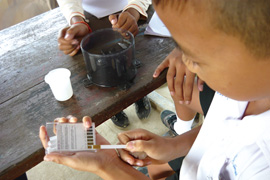The Mitsui & Co. Environment Fund
Introduction to Grant Projects
Japan Environmental Sanitation Center/Asia Center for Air Pollution Research (ACAP)
Business to promote public awareness and environmental education regarding East Asia atomospheric pollution, and acid rain problems
Activity grant
- Project Description
As a result of rapid industrialization in East Asia, atmospheric pollution has become a major problem across a wide area that transcends national borders and includes, among others, problems of acid rain and photochemical oxidants. Conducting countermeasures to these problems involves the daily lives of the citizens affected and understanding of the issues is required, not just among policymakers but among ordinary citizens. However, in many countries public awareness of the issues is poorly developed and the promotion of environmental education in schools is a vital issue. In response, this group creates tools that can be used in raising public awareness and conducting environmental education activities in regard to atmospheric pollution including acid rain. Specifically, it produces factsheets taht summarize the problem of atmospheric pollution in each country in East Asia, including the latest monitoring results and countermeasures, distributes these in each country and links up with NGOs to conduct public awareness activities. Also the group has produced and distributed a guidebook for use in environmental prgrams in Asian countries that is based on the participatory learning program focused on conducting experiments demonstrating atmospheric pollution and acid rain implemented in elementary schools in Japan and Thailand in 2007 and 2008.
- Fields
- Climate changePreservation of biodiversity and ecosystem
- Grant year
- FY2009 Activity Grants
- Grant term
- 3 years
October 2009 - September 2012
- Grant amount
- 8,550,000 yen
- Activity region
- Japan and the countries of East Asia

Overview of the Organization

- Representative
- The Asia Center for Air Pollution Research, Dr. Kazuhiko Sakamoto, Director General
- Establishment
- 1954
- Establishment purpose
- The Japan Environmental Sanitation Center was established with the aim of providing technical guidance and support to environmental health groups and others and thereby promoting the spread of an understanding of environmental health, a sound life environment and increasing the public welfare of communities through better environmental health. The Asia Center for Air Pollution Research was established in 1998 to perform a central role in the scientific and technical support of the Acid Deposition Monitoring Network in East Asia (EANET), while also supporting acid rain countermeasures in Japan.
- Main areas of activity
- Mainly Japan and the countries of East Asia
- Staff
- 172 people full-time staff members
- Annual operating budget
- 2,614.29 billion yen in 2006, 2,429.94 billion yen in 2007, 2,573.81 billion yen in 2007
- WEB site
- http://www.acap.asia/acapjp/index.html
- Main activities
- The Japan Environmental Sanitation Center (JESC) (1) comprehensively supports the proper management of waste geared towards the establishment of a sound-material-cycle society (3R), ranging from the formulation of waste management plans to the construction of treatment facilities. (2) JESC tackles diverse environmental issues ranging from local environmental problems to global environmental problems, (3) helps to make people's life environment more pleasant by controlling pests and nuisances (4) and conducts training and international cooperation activities, publishes books, holds symposia nationwide, and conducts waste treatment facility verification. The Asia Center for Air Pollution Research, (1) collects, assesses, stores and provides monitoring data and other information and produces data reports, (2) EANET promotes the maintenance of the trustworthiness of data from participating countries (QA and QC activities), (3) provides technical training support, (4) and promotes research and training, (5) environmental training and the spread of public awareness.